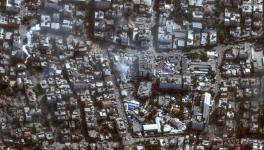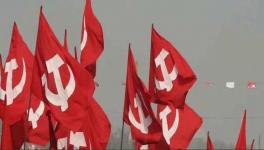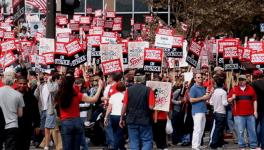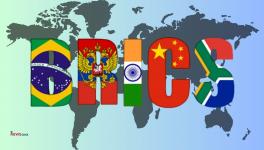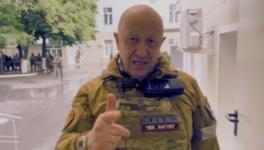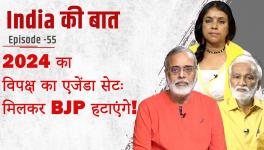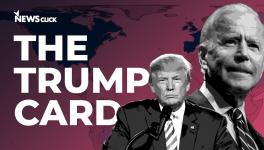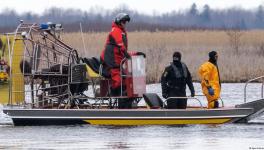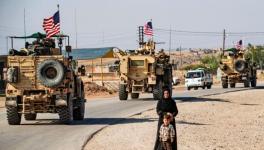Sixth Year of War in Syria Marked by Tremendous Civilian Casualties
This week marks the sixth year of war in Syria, with the Syrian Centre for Policy Research making the death toll since 2011 at 470,000. This week also accounted for several hundred deaths where there were many reports of civilians caught in the crossfire, or some reports indicate they are being used as human shields.
SHARMINI PERIES: It's The Real News Network. I'm Sharmini Peries coming to you from Baltimore.
This week marks the sixth year of war in Syria, with the Syrian Centre for Policy Research making the death toll since 2011 at 470,000. This week also accounted for several hundred deaths where there were many reports of civilians caught in the crossfire, or some reports indicate they are being used as human shields.
On to discuss the development in Syria with me, is Vijay Prashad. Vijay is the George and Martha Kellner Chair in South Asian History, and Professor of International Studies at Trinity College. His latest book is, Letters to Palestine: Writers Respond to War and the Occupation. Thank you so much for joining us.
VIJAY PRASHAD: A pleasure.
SHARMINI PERIES: So, Vijay, it's a difficult situation in Mosul for those who are trapped there. What's going on?
VIJAY PRASHAD: Well, there's evidence coming out that ISIS fighters have been using so-called human shields. This was a story that first came in 2016, and indeed, this is an intuitive issue. In other words, when certain fighters are inside a city, they're not going to expose themselves directly to air fire, or to tank fire. They're going to hide among the population. That's inevitable. And that has to be factored in when one fights in any city. The United States saw this in Fallujah in 2004, when the current Secretary of Defense James Mattis led the Marines into that city. The civilian casualty was quite significant at that time.
So, I think it's interesting how every time there's an attack on a city people are surprised that the forces inside who are cornered use civilians as shields. That's exactly what always happens. Whether it's Aleppo, Falluja, Baghdad or in this case Mosul. And, of course, this is a lead-up to Raqqa, where exactly this is going to happen.
So, one of the things to wonder about, is the nature of the war that people prosecute against cities. These wars are exactly without consideration for civilians. In the last week, there have been a series of bombings conducted by the United States in Northern Syria, where the civilian casualty toll has been considerable. One of them, for instance, in the town of al-Masura, near Raqqa, has a loss of life between 23; basically confirmed by the Syrian Observatory, and 101 casualties, which is the number provided by a group inside Raqqa, called, Raqqa Suffers Silently.
So, the war on civilians in these wars is quite considerable. And I think one shouldn't underestimate what has been happening in this entire region, as very well prepared armies have been trying to deal with these guerilla outfits that hide among the people.
SHARMINI PERIES: Right. Now we know there are already 400 Marines, 500 more Special Forces were sent in. Now the U.S. is discussing making this open-ended. They're expecting to send 1,000 more in the next few weeks, and General Mattis is trying to get Congress to approve a somewhat open-ended approach in Syria. What do you make of this?
VIJAY PRASHAD: Well, this is going to pose some problems as Mattis moves forward. As we talk right now, in Geneva the various parties are meeting with the so-called Syria Talks the process for some kind of peace agreement in Syria and these talks have been contentious. In other words, there was a process started in Kazakhstan in Astana where a series of talks had taken place.
At the last set of talks the Syrian Armed Opposition, which had initially come to those talks, didn't show up. And one of the reasons it seems that they didn't show up is that they don't see much flexibility from the Syrian government. In other words, the Syrian government has now got this understanding that it is basically on the path to victory so it need not make concessions to the Armed Syrian Opposition. And this feeling I think rattled some of the process a little and it seems a little fraught even in Geneva.
But if the United States enters with a large force at this time, before the matter of the war outside ISIS is settled, it's not clear that this is not going to create even more problems for the peace process.
On Sunday last, there was a major assault inside Damascus led by the al-Rahman Legion and some Al Qaeda groups as well. But the al-Rahman Legion is largely made up of defectors from the Syrian Army and other various rebel fighters. And they came into the heart of Damascus, took the government by surprise. Some people are suggesting that this is a message being sent to the government that, You better take the Armed Opposition seriously. Maybe other groups outside Syria have encouraged these people to break through the government lines and send this message.
So, what I'm trying to say is that this sort of peace negotiation between the government and the Armed Opposition, which is not ISIS, is itself in a sensitive place; a very difficult kind of fraught place. I think it's important to let that process go forward before rushing to sending more American troops which neither the Syrian government nor the Turkish government nor sections of the Armed Opposition are going to welcome. I think it's going to create far more chaos than clarity.
I think the entry of more American troops has much more to do with the kind of campaign promises Donald Trump made, rather than to do with an understanding of the political and military situation inside Syria and Iraq.
SHARMINI PERIES Right. And further adding to this, Assad and also the negotiators in Geneva that you referred to, all have come out and said that any uninvited foreign forces in Syria are really invaders of their country. How is the Assad government responding to this on the ground? And what are the Russians up to as well?
VIJAY PRASHAD: Well, as we talked about last time, the Russians have created a kind of ... to prevent the Syrian Army going too close to where the Americans are. I think everybody is very, very cautious. They don't want to see this very over-heated political environment spill out into the battlefield. I think that would be catastrophic.
In Geneva, there is now a four-part agenda that has been agreed on. The first three parts, which are about elections and about things like reformed governance, etcetera, are about the so-called transition from the Assad regime to a future Syrian government. That's the first three parts of this four-part agenda that has been set.
The fourth part is counter-terrorism. And this was placed on the table at the insistence of Mr. al-Ja'afari, who's the Syrian Ambassador to the United Nations. The parties agreed to have the fourth point put on the agenda, counter-terrorism, which means the agenda is basically against terrorism but also towards some kind of political reform inside Syria.
Now, to my mind, it looks like a very simple kind of agenda. But inside it's filled with contradictions and disagreements. For instance, how do you define terrorism? The Syrian government defines everybody that's fighting inside Syria that is not wearing the uniform of the Syrian government or has not been invited by the Syrian government as a terrorist. That means the entirety of the Armed Opposition, ISIS and perhaps the Turkish troops that are inside the country would be deemed as terrorists. This is going to create a lot of problems in the discussions.
But about the first three items of political reform, I think these need to be taken very seriously, and they shouldn't allow this counter-terrorism to eclipse the first three. In other words, there has to be a political process that brings large sections of the Armed Opposition into dialogue with the government. I think it's very wrong to see the entirety of the Armed Opposition as terrorists because that essentially would put off the political conversation that needs to happen and would prevent the prolongation of this war forever.
I think the Syrian government is a little in error if it believes that it has entirely won the war. It's true that it has the upper hand and that's precisely the point when it should negotiate and not take a very strong position saying, There's nothing to talk to the terrorists about.
So, what I'm getting at is the table is set now for the discussion at least to proceed a little way forward. But I think Mr. Trump's entire position about, gotta smash ISIS, etcetera and focusing everything on ISIS, takes the heat off the politics that needs to be settled inside Syria. You cannot just say, Everything's about ISIS. The politics inside Syria have to be given some serious accommodation. And I very much hope that in Geneva over the course of the next few days, the Syrian government accepts that there are political discussions to be had with sections of the Armed Opposition.
SHARMINI PERIES: All right very well, Vijay, we'll follow up on that next week. Thank you so much for joining us.
VIJAY PRASHAD: Thanks a lot.
SHARMINI PERIES: And thank you for joining us here on The Real News Network.
Get the latest reports & analysis with people's perspective on Protests, movements & deep analytical videos, discussions of the current affairs in your Telegram app. Subscribe to NewsClick's Telegram channel & get Real-Time updates on stories, as they get published on our website.









